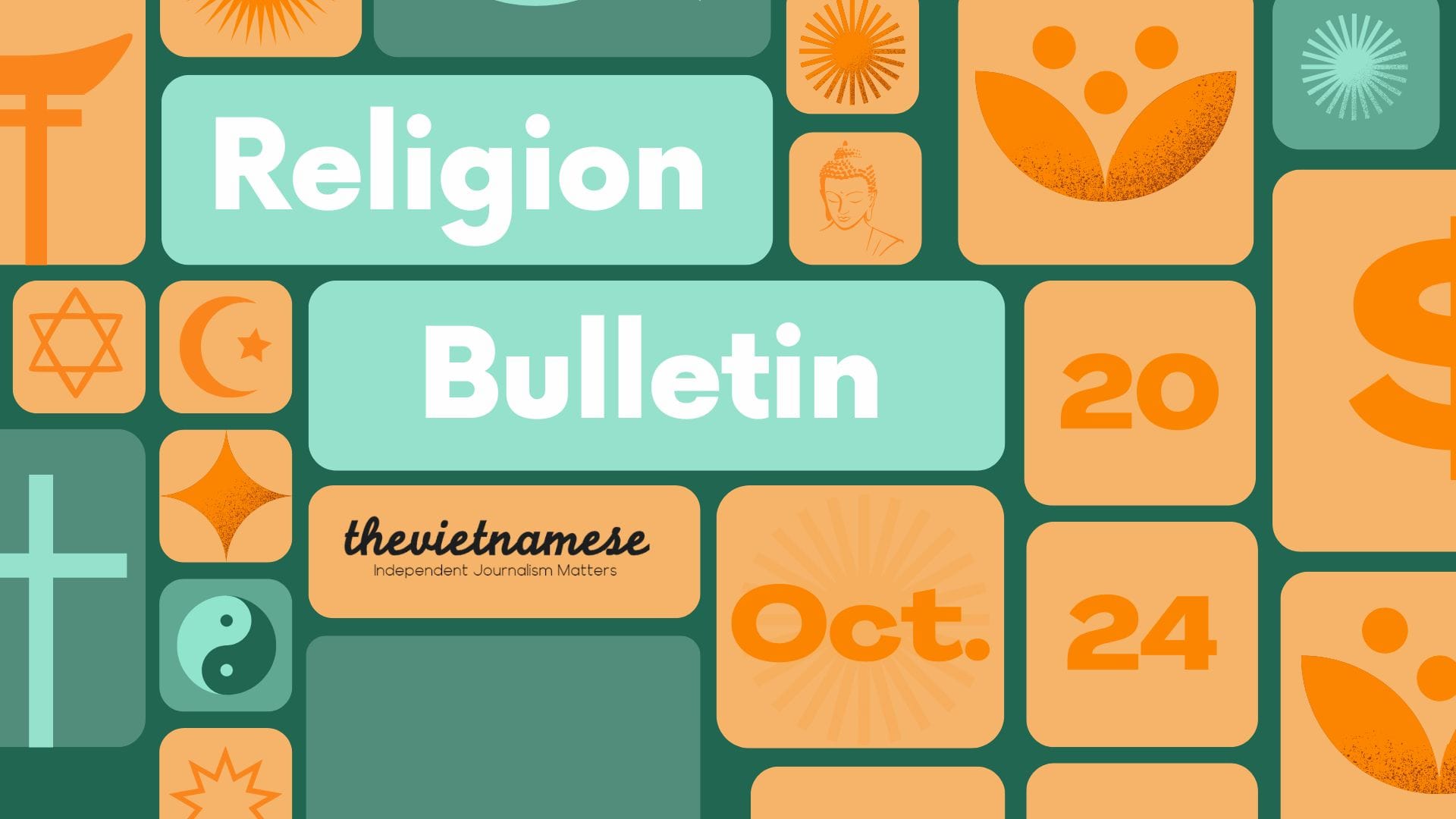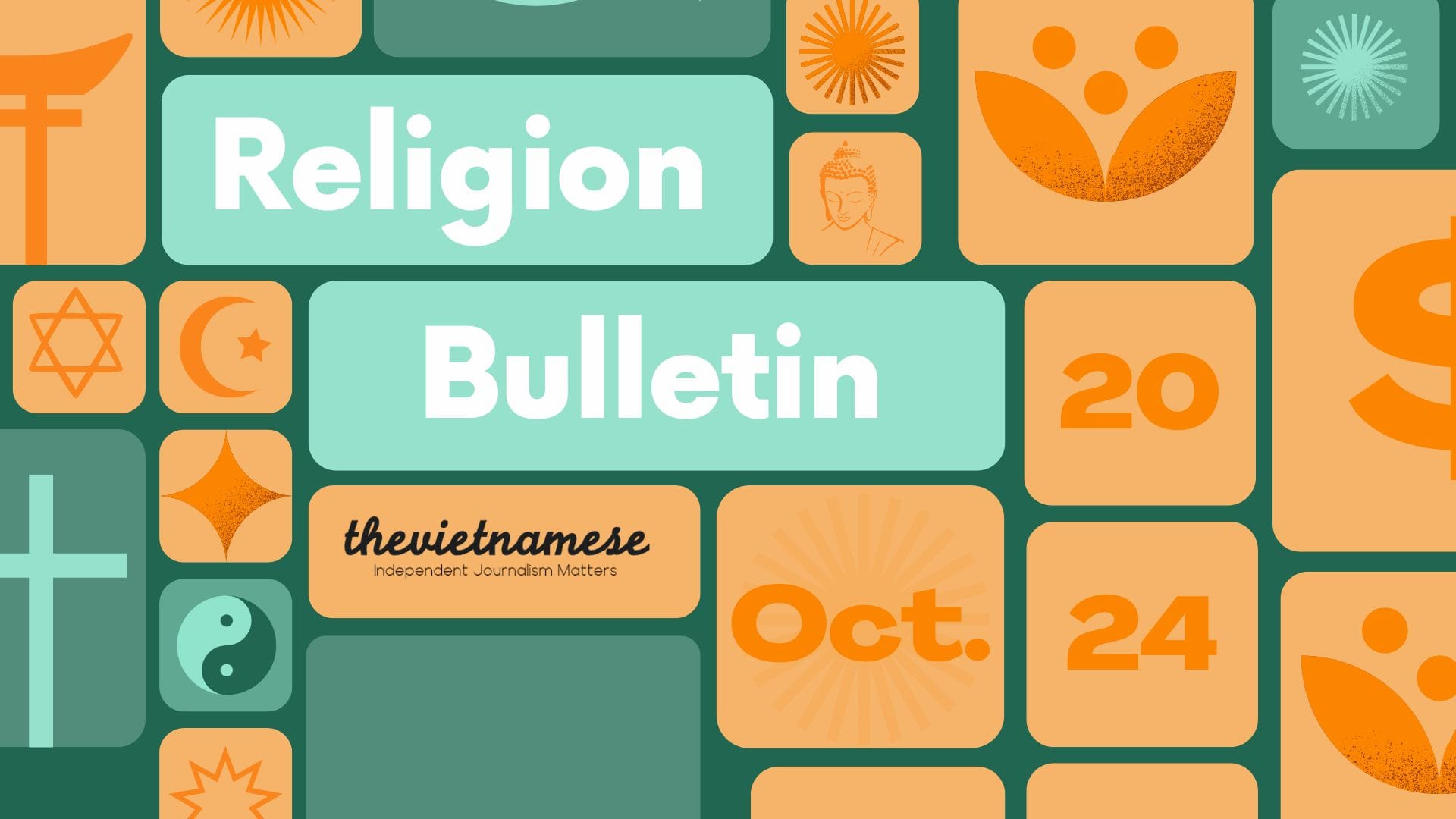
The October 2024 Religious Freedom Bulletin by Luật Khoa Magazine highlights the following key events:
- An independent Cao Đài Chơn Truyền 1926 follower sues the authorities for revoking his business license because of his religion.
- Vietnam is accused of arbitrarily detaining Khmer Krom Buddhist followers.
- Cao Bằng Province completely eradicates the Dương Văn Mình religion.
Cao Đài Chơn Truyền 1926 Follower Sues Government over Business License Revocation
At the end of September 2024, the People’s Court of Tân An City, Long An Province, held a trial in a lawsuit between Lê Văn Một, a follower of Cao Đài Chơn Truyền 1926, and the Department of Finance and Planning under the People’s Committee of Tân An City.
In 2022, Một had established a household funeral business named Trại Hòm Phước Thiện 257, which was granted a business license by the Department of Finance and Planning of Tân An City.
However, by the end of 2023, this business license was revoked. According to some media outlets, the reason was that Một displayed a signboard at his business premises identifying himself as a follower of Cao Đài Chơn Truyền 1926.
Between December 2022 and January 2023, local authorities visited Một’s house several times to ask him to take down the signboard, but he refused.
At the trial, the court acknowledged that Một’s sign was not a commercial advertisement. However, it still did not allow him to display the sign, without giving any reason.
On Oct. 11, the Tân An City People’s Court invited him for another meeting, but no specific information has been released yet about the outcome of the meeting.
Cao Đài Chơn Truyền 1926 is an independent religious organization. Its followers often face government harassment and discrimination.
The Vietnamese government has recently intensified efforts to restrict the activities of the Cao Đài religion. In March 2022, authorities coordinated with Cao Đài groups across multiple provinces, including Đà Nẵng, Bến Tre, Tây Ninh, Long An, Kiên Giang, and Tiền Giang, as part of a broader national initiative to “review 30 years of implementing Notice No. 34-TB/TW, dated November 14, 1992, issued by the Party Central Secretariat regarding policies toward the Cao Đài religion.”
Vietnam Accused at the United Nations for Detaining Khmer Krom Buddhist Followers
On Oct. 22, the Human Rights Foundation (HRF) and the Khmer Kampuchea-Krom Federation (KKF) submitted a joint petition to the United Nations Working Group on Arbitrary Detention (UNWGAD).
In the petition, they accused the Vietnamese government of arbitrarily detaining two Khmer Krom Buddhist followers: Tô Hoàng Chương and Thạch Cương. The two organizations stated that this action violated international law and called on the Vietnamese authorities to release both individuals.
Tô Hoàng Chương and Thạch Cương are Khmer Krom Buddhists from the Mekong Delta region. Both are activists who support the recognition of the Khmer Krom as an indigenous people, as well as their rights to religious freedom and the preservation of Khmer Krom culture.
On March 20, the People’s Court of Cầu Ngang District, Trà Vinh Province, sentenced Thạch Cương to four years in prison and Tô Hoàng Chương to 3.6 years for “abusing democratic freedoms to infringe upon the interests of the state and the lawful rights and interests of organizations and individuals,” under Article 331 of the Penal Code.
Khmer Krom people in Vietnam have long protested, demanding land rights, Indigenous rights, religious freedom, and the preservation of traditional culture.
The Vietnamese government asserts that Khmer Krom people are treated equally and denies all allegations of persecution or discrimination. However, in reality, the authorities have applied some restrictive policies toward this community. Many Khmer Krom Buddhist followers have fled across the border to Cambodia, saying they are being persecuted and discriminated against under these policies.
Phú Yên Fines Evangelical Follower of Central Highlands Christ Church
On Oct. 3, the Police Department of Sông Hinh District, Phú Yên Province, issued an administrative penalty of 4 million dong against Ksor Y Thêm (also known as Ma Ní) for “abusing belief and religion to violate the law,” specifically for regularly gathering people to pray at his home and illegally preaching the Evangelical Church of the Central Highlands Christ.
According to the authorities, this behavior violated Point c, Clause 4, Article 7 of Decree No. 144/2021/NĐ-CP, which regulates administrative penalties in the areas of public security, order, and social safety.
Previously, the government had repeatedly brought Ksor Y Thêm in for public criticism sessions to warn and deter him from spreading the Evangelical Church of the Central Highlands Christ, but he did not stop.
Since the attack on police and local government offices in Cư Kuin District, Đắk Lắk Province, the authorities have become more sensitive and have tightened their control over the activities of followers of this religious group.
Phú Yên Province, according to Luật Khoa Magazine, appears to have taken some of the strongest measures to combat the spread of unrecognized religions.
In January 2024, the People’s Court of Phú Yên Province sentenced Nay Y Blang, a follower of the same religion, to 4.6 years in prison for “abusing democratic freedoms to infringe upon the interests of the state and the lawful rights and interests of organizations and individuals.”
Đắk Lắk Arrests an Independent Evangelical Follower
According to a statement by Montagnards for Justice, on Sept. 5, the authorities in Đắk Lắk Province arrested Y Thinh Niê, a follower of the Evangelical Church of the Central Highlands Christ.
According to the statement, a group of four police officers suddenly entered his house and arrested him and his wife without giving any reason. His wife was released the same day, but Y Thinh Niê remains in detention.
The authorities asked his wife to leave the Evangelical Church of the Central Highlands Christ and instead join the state-recognized Evangelical Church of Vietnam, but she refused.
In July 2024, Y Thinh Niê and 14 other followers sent a letter to the leaders of the Evangelical Church of Vietnam affirming their decision not to join this state-approved organization.
On Sept. 24, the U.S. Commission on International Religious Freedom called for Y Thinh Niê’s release, but there has been no update on his situation since.
Hà Giang Persuades Nearly 5,000 Followers to Leave the San Sư Khẻ Tọ Religion
On Oct. 16, the Hà Giang Provincial Police announced that they had persuaded 748 households, with nearly 5,000 followers, to abandon the so-called “heretical” religion San Sư Khẻ Tọ from 2018 until now. The San Sư Khẻ Tọ religion is a little-known Vietnamese religious sect blending elements of Buddhism, Daoism, and spirit mediumship. The group is often associated with mystical practices and rural spiritual beliefs
This campaign started after the Hà Giang Provincial Party Committee issued Plan No. 23-ĐA/TU on “Preventing, fighting, and resolving the situation of heretical and strange religions in the province during the 2018–2025 period.”
Hà Giang is one of the provinces that has actively worked to eliminate the San Sư Khẻ Tọ religion. As of October, the authorities claim they have eradicated this religion in the districts of Mèo Vạc, Đồng Văn, Quản Bạ, and Yên Minh.
Currently, 267 households with around 1,079 followers still practice San Sư Khẻ Tọ in Hà Giang. The authorities plan to completely eliminate this religion in the province in 2025.
Cao Bằng Completely Eliminates Dương Văn Mình Religion
According to the National Assembly’s official website, Cao Bằng Province has completely eliminated the Dương Văn Mình religion in its area. Earlier, in February 2024, Cao Bằng authorities had already stopped all activities of the religion across the province.
Four northern provinces, Cao Bằng, Lào Cai, Thái Nguyên, and Bắc Kạn, have announced the complete elimination of the Dương Văn Mình religion. They have fulfilled the tasks under Plan No. 78, issued by the government in 2021, aimed at “combating, preventing, and eventually eliminating the illegal organization Dương Văn Mình.”

